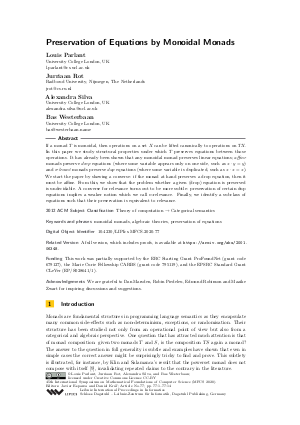Preservation of Equations by Monoidal Monads
Authors Louis Parlant, Jurriaan Rot, Alexandra Silva, Bas Westerbaan
-
Part of:
Volume:
45th International Symposium on Mathematical Foundations of Computer Science (MFCS 2020)
Part of: Series: Leibniz International Proceedings in Informatics (LIPIcs)
Part of: Conference: Mathematical Foundations of Computer Science (MFCS) - License:
 Creative Commons Attribution 3.0 Unported license
Creative Commons Attribution 3.0 Unported license
- Publication Date: 2020-08-18
File

PDF
LIPIcs.MFCS.2020.77.pdf
- Filesize: 5.58 MB
- 14 pages
Document Identifiers
Related Versions
-
A full version, which includes proofs, is available at https://arxiv.org/abs/2001.06348.
Subject Classification
ACM Subject Classification
- Theory of computation → Categorical semantics
Keywords
- monoidal monads
- algebraic theories
- preservation of equations
Metrics
- Access Statistics
-
Total Accesses (updated on a weekly basis)
0Document
0Metadata
Abstract
If a monad T is monoidal, then operations on a set X can be lifted canonically to operations on TX. In this paper we study structural properties under which T preserves equations between those operations. It has already been shown that any monoidal monad preserves linear equations; affine monads preserve drop equations (where some variable appears only on one side, such as x⋅ y = y) and relevant monads preserve dup equations (where some variable is duplicated, such as x ⋅ x = x). We start the paper by showing a converse: if the monad at hand preserves a drop equation, then it must be affine. From this, we show that the problem whether a given (drop) equation is preserved is undecidable. A converse for relevance turns out to be more subtle: preservation of certain dup equations implies a weaker notion which we call n-relevance. Finally, we identify a subclass of equations such that their preservation is equivalent to relevance.
Cite As Get BibTex
Louis Parlant, Jurriaan Rot, Alexandra Silva, and Bas Westerbaan. Preservation of Equations by Monoidal Monads. In 45th International Symposium on Mathematical Foundations of Computer Science (MFCS 2020). Leibniz International Proceedings in Informatics (LIPIcs), Volume 170, pp. 77:1-77:14, Schloss Dagstuhl – Leibniz-Zentrum für Informatik (2020)
https://doi.org/10.4230/LIPIcs.MFCS.2020.77
BibTex
@InProceedings{parlant_et_al:LIPIcs.MFCS.2020.77,
author = {Parlant, Louis and Rot, Jurriaan and Silva, Alexandra and Westerbaan, Bas},
title = {{Preservation of Equations by Monoidal Monads}},
booktitle = {45th International Symposium on Mathematical Foundations of Computer Science (MFCS 2020)},
pages = {77:1--77:14},
series = {Leibniz International Proceedings in Informatics (LIPIcs)},
ISBN = {978-3-95977-159-7},
ISSN = {1868-8969},
year = {2020},
volume = {170},
editor = {Esparza, Javier and Kr\'{a}l', Daniel},
publisher = {Schloss Dagstuhl -- Leibniz-Zentrum f{\"u}r Informatik},
address = {Dagstuhl, Germany},
URL = {https://drops.dagstuhl.de/entities/document/10.4230/LIPIcs.MFCS.2020.77},
URN = {urn:nbn:de:0030-drops-127460},
doi = {10.4230/LIPIcs.MFCS.2020.77},
annote = {Keywords: monoidal monads, algebraic theories, preservation of equations}
}
Author Details
Funding
This work was partially supported by the ERC Starting Grant ProFoundNet (grant code 679127), the Marie Curie Fellowship CARBS (grant code 795119), and the EPSRC Standard Grant CLeVer (EP/S028641/1).
Acknowledgements
We are grateful to Dan Marsden, Robin Piedeleu, Edmund Robinson and Maaike Zwart for inspiring discussions and suggestions.
References
-
Ronald V. Book and Friedrich Otto. String-rewriting systems. In String-Rewriting Systems, pages 35-64. Springer, 1993.

-
J.R.B. Cockett and R.A.G. Seely. Linearly distributive functors. Journal of Pure and Applied Algebra, 143(1-3):155-203, 1999.

-
Fredrik Dahlqvist, Alexandra Silva, and Louis Parlant. Layer by layer: composing monads. In ICTAC, 2018.

-
N.D. Gautam. The validity of equations of complex algebras. Archiv für Mathematische Logik und Grundlagenforschung, 3(3-4):117-124, 1957.

-
Martin Hyland, Paul Blain Levy, Gordon Plotkin, and John Power. Combining continuations with other effects. In Proc. Continuations Workshop, 2004.

-
Bart Jacobs. Semantics of weakening and contraction. Annals of pure and applied logic, 69(1):73-106, 1994.

-
Ohad Kammar and Gordon D. Plotkin. Algebraic foundations for effect-dependent optimisations. In POPL, pages 349-360. ACM, 2012.

-
David J. King and Philip Wadler. Combining monads. In Functional Programming, Glasgow 1992, pages 134-143. Springer, 1993.

-
Bartek Klin and Julian Salamanca. Iterated covariant powerset is not a monad. MFPS XXXIV, 2018.

-
Anders Kock. Monads on symmetric monoidal closed categories. Archiv der Mathematik, 21(1):1-10, 1970.

-
Anders Kock. Bilinearity and cartesian closed monads. Mathematica Scandinavica, 29(2):161-174, 1972.

-
Anders Kock. Strong functors and monoidal monads. Archiv der Mathematik, 23(1):113-120, 1972.

-
Saunders Mac Lane. Categories for the working mathematician, volume 5. Springer, 2013.

-
Ernie Manes and Philip Mulry. Monad compositions i: general constructions and recursive distributive laws. Theory and Applications of Categories, 18(7):172-208, 2007.

-
Ernie Manes and Philip Mulry. Monad compositions ii: Kleisli strength. Mathematical Structures in Computer Science, 18(3):613-643, 2008.

-
Micah Blake McCurdy. Graphical methods for Tannaka duality of weak bialgebras and weak Hopf algebras in arbitrary braided monoidal categories. arXiv preprint arXiv:1110.5542, 2011.

-
Paul-André Melliès. Functorial boxes in string diagrams. In International Workshop on Computer Science Logic, pages 1-30. Springer, 2006.

- Louis Parlant, Jurriaan Rot, Alexandra Silva, and Bas Westerbaan. Preservation of equations by monoidal monads, 2020. URL: http://arxiv.org/abs/2001.06348.
-
Maciej Pirog and Sam Staton. Backtracking with cut via a distributive law and left-zero monoids. Journal of Functional Programming, 27, 2017.

-
Ana Sokolova, Bart Jacobs, and Ichiro Hasuo. Generic trace semantics via coinduction. Logical Methods in Computer Science, 3, 2007.

-
Maaike Zwart and Dan Marsden. No-go theorems for distributive laws. In LICS, pages 1-13. IEEE, 2019.

